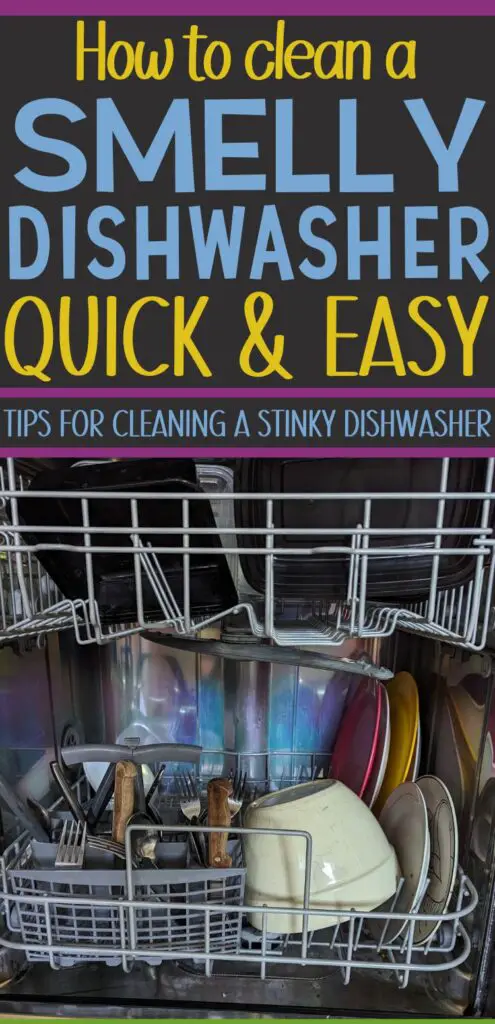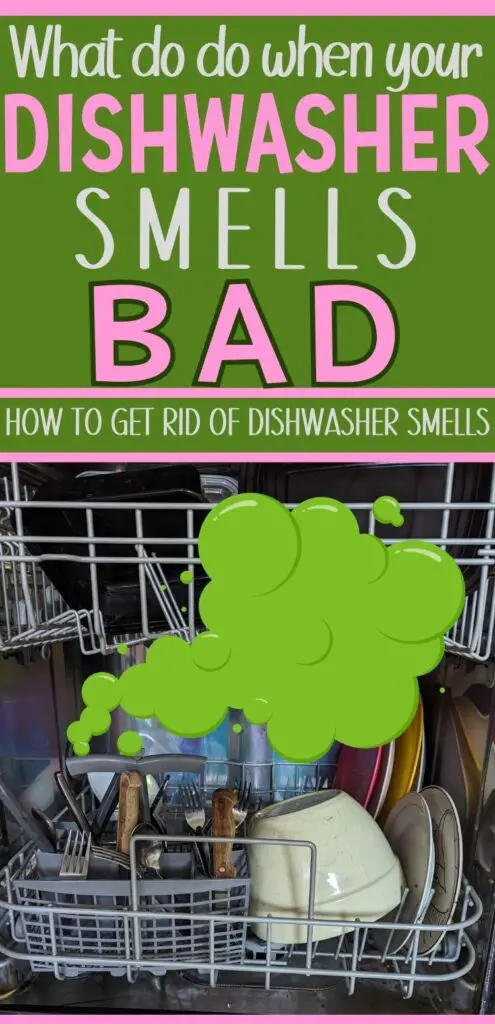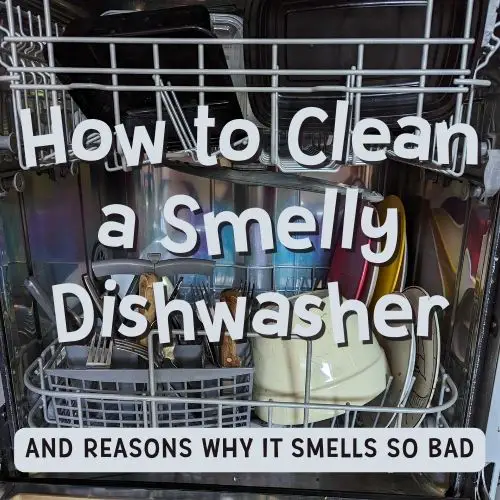It happens to the best of us. You go to use your dishwasher and, as you open the door, you get hit with a nasty, gag-inducing smell. Or your dishes smell weird right after you’ve run them through a cycle. Don’t jump to go buy a new one just yet, as we have some easy, effective tips on how to clean a smelly dishwasher and get your dishwasher clean again.
Cleaning a smelly dishwasher takes more time than effort, and the dishwasher does most of the work for you. Here are some ways to clean a smelly dishwasher, deodorize it to get rid of that unpleasant odor, and maintain your dishwasher to get your dishes clean again. But first, we we’ll troubleshoot the source of that unpleasant odor.
As an Amazon Associate I earn from qualifying purchases. This means if you click on a link and buy something I’ve recommended, I get a small commission at no additional cost to you. You can see my full Disclosure Policy here.

What Causes a Smelly Dishwasher?
Leftover Food Debris
Dishwashers provide a warm and humid environment where bacteria and mold thrive and grow. As bacteria feed on the decaying organic matter and multiply, they produce waste products that can release strong, pungent odors and make your dishwasher smell rotten.
Grease and Soap Scum
Greasy residues from oils and fats can also decompose over time and produce rotten odors. Sometimes, your dishwasher stinks because soap scum and moisture can lead to mold and mildew growth that can make your dishwasher smell musty.
Mineral Buildup and Hard Water Stains
Soap scum can also interact with minerals in hard water and leave mineral deposits that can trap food particles and bacteria. If your water contains high levels of sulfur, bacteria can react with the sulfur to produce sulfur compounds that can make your dishwasher smell like rotten eggs.
RELATED POST: Say Goodbye to the Stink: How to Get Rid of Rotten Meat Smell

How to Clean a Smelly Dishwasher
If you have a smelly dishwasher problem, the first step is to learn how to clean the inside of your dishwasher to eliminate any debris and remove the source of bad dishwasher odors. Make sure the dishwasher is completely empty, then follow these steps to deep clean your smelly dishwasher to ensure the inside of the dishwasher is completely cleaned.
How to Clean Dishwasher Filter
The first thing I always do is clean the filter. This is most likely the cause of odors coming from your dishwasher as the filter is where food particles get trapped and decay. Over time, this warm, moist environment becomes a breeding ground for bacteria that cause odor.
- Once you’ve located and removed the dishwasher’s filter, separate the pieces if necessary.
- Place the pieces in hot, soapy water and let them soak for a few minutes.
- Use an old toothbrush or soft-bristled nylon brush to scrub away any food, grease, or other debris in the filter.
- Once all dirt has been removed from the filter, rinse it with clean, hot water.
- Wipe down the opening where the filter was removed with a sponge or dishcloth dipped in the hot soapy water. Make sure to remove any food particles or grease build-up.
- Put the pieces together, if necessary, and place the assembled filter back into the place it belongs.
- Twist or screw it to lock it into place.
Wash Inside the Door and Interior Walls
Grease and grime build-up inside the dishwasher can also be a cause of your stinky dishwasher. Scrub the inside of the door with hot, soapy water, paying particular attention to where the dishwasher door meets the bottom. Don’t forget to clean the detergent and rinse aid compartments. Clean all 3 interior walls, the top surface, and the floor of the dishwasher using hot, soapy water.
Clean the Door Gasket
Just like a front-loading washing machine, the seals of the dishwasher door can also accumulate moisture and grime and should be thoroughly washed with soap and water. Check to make sure that no food particles are stuck in the gasket grooves.
Clean The Spray Arms
Sometimes food debris can clog the ports or holes along the sprayer arm. Unscrew the spray arms from the base and the top of the dishwasher. Inspect the spray arm openings for any clogs, and remove any blockages with a pin or the end tine of a fork. Wash them with soapy water.
Scrub the dishwasher racks and cutlery basket
While the dishwasher racks are not likely to be the cause of the odor, this will help rule them out as a source of the problem. It only takes a few minutes to clean the bottom and top rack of the dishwasher with warm, soapy water. Don’t forget to clean the cutlery tray, fold-down trays and clips too as they can trap food debris.
RELATED POST: DIY shoe deodorizer: 16 ways to refresh stinky shoes
Where is my Dishwasher Filter?
Most dishwasher filters are located at the bottom of the dishwasher tub, where gravity gathers the loose bits of food. Look for a grate or mesh-covered area at the bottom of the machine as that’s usually where the filter is.
Depending on the dishwasher model, the filter might be visible right away or slightly hidden by other parts. Some dishwasher filters can just be twisted counterclockwise to remove them. In other cases, you might need to unscrew a cover to fully access the filter.
Before you start unscrewing anything, check your dishwasher’s user manual for specific instructions to locate and remove the filter for your particular model. If you can’t find your manual, you can usually find the make and model of your dishwasher somewhere on the door or around the edge of the dishwasher. You can google it to find where your filter is so you can clean the drain filter.
How to Get Rid of Dishwasher Smell and Deodorize
Citric acid powder is a safe and effective homemade dishwasher cleaner that removes odor-causing particles you can’t see. The acidity of the citric acid breaks down soap scum, minerals from hard water stains, grease, oils, and other residues that may still be trapped in the dishwasher.
If you don’t have any citric acid on hand or prefer to clean your dishwasher with vinegar, distilled white vinegar will deodorize a dishwasher just as well. You can even use both if you want, but you don’t need to.
- Fill the detergent cup with citric acid crystals and close it. If you’re using vinegar, place 2 cups of white vinegar in a dishwasher-safe bowl and place it on the bottom rack of the dishwasher.
- Run your dishwasher for a full cycle. The citric acid solution or vinegar will be blasted all over the interior of the dishwasher to break down any residues that remain in the interior of your dishwasher.
- Open the dishwasher door and sprinkle 1 cup of baking soda over the bottom of your dishwasher. Baking soda is a well-known odor neutralizer, and following the citric acid bath with a rinse of baking soda is another natural solution to remove odors.
- Close the dishwasher and run another cycle. This time, choose the shortest dishwasher cycle available and set the water at the hottest it can be to dissolve all of the baking soda.
This process is a great way to disinfect your dishwasher to kill any remaining germs and should leave your dishwasher smelling fresh and clean.
RELATED POST: 3 Simple DIY disinfectant sprays that work!
Other Reasons Why Dishwasher Smells Won’t Go Away
So you’ve tried cleaning and disinfecting your dishwasher, but your dishwasher still smells bad. The bad odor could be caused by something other than leftover food debris, grease and soap scum, or hard water mineral deposits. Here are some troubleshooting tips if you still have a bad smell in your dishwasher:
Check the Drain
If your dishwasher smells like sewage, there’s a good chance you have a drain problem. Check that the drain hose under the sink isn’t clogged and has a high loop to block water from flowing back in. Here’s some more information on dishwasher drains.
Check for Level
Make sure your dishwasher is perfectly level from front to back. When the dishwasher isn’t level, it can cause water in the dishwasher to pool in certain areas that don’t drain. Water that remains in the dishwasher can become stagnant and breed bacteria, which can make the dishwasher smell like fish.
Check for Dead Animals
At this point, you’ve cleaned everything inside of the dishwasher, checked the drains and made sure the machine was level, but your dishwasher still smells like rotting meat. Unfortunately, a mouse or other small animal may have died underneath, beside, or even behind your dishwasher. You will have to pull the unit out, inspect the area, and remove anything you find.
If you find a dead animal, make sure you remove all traces of it, clean the area thoroughly with soap and water before moving the dishwasher back. The next step is to disinfect the affected area with hydrogen peroxide or rubbing alcohol, before replacing the dishwasher in its space.
How to Keep Dishwasher from Smelling Between Washes
To help keep your dishwasher from becoming stinky, some minor dishwasher maintenance can go a long way. Keep your dishes sparkling clean by using the following tips:
Scrape off Excess Food
Before loading dishes into the dishwasher, make sure to scrape off any excess food. The more food particles that enter the dishwasher, the more likelihood that your dishwasher starts smelling bad.
Clean the Dishwasher Filter Regularly
It’s important to clean your dishwasher filter regularly to avoid having a smelly dishwasher. Depending on how often you run the dishwasher, a good rule of thumb is to clean it every 25 uses, or once a month if you use it daily.
Run Deodorizing Cycles Regularly
Make it a habit to use this method to clean a smelly dishwasher on a regular basis using citric acid or vinegar and baking soda. It’s a good idea to run a citric acid or vinegar cycle on a monthly basis. Follow it up and run your empty dishwasher on a very hot cycle with baking soda as outlined above.
Keep the Door Open
Some dishwasher units are very airtight and can develop a musty smell. Crack the door open as soon as the cycle is complete to let the dishwasher air out. Leave the door open when it’s not running.
Run the Garbage Disposal Unit Before the Dishwasher
When you have a garbage disposal, there is a possibility of food or debris preventing the proper drainage of water from your dishwasher. It’s a good idea to always run the garbage disposal before running the dishwasher.
What if None of These Tips Works?
If none of these tips work and you’re still dealing with a bad smell, you should call a plumber or appliance expert for help. It could be caused by a larger problem with the plumbing or the unit itself. However, if your dishwasher is just really old and can’t keep up anymore, you just might have to bite the bullet and buy a new one.

